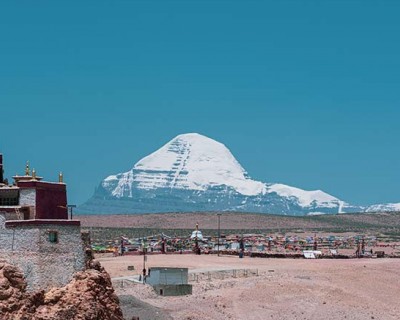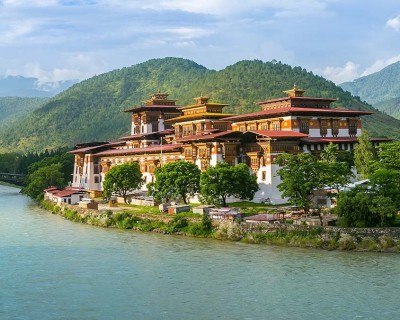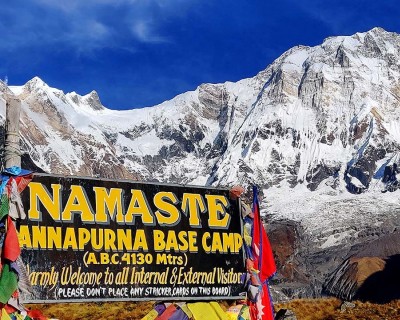Manaslu Trek in October Highlights
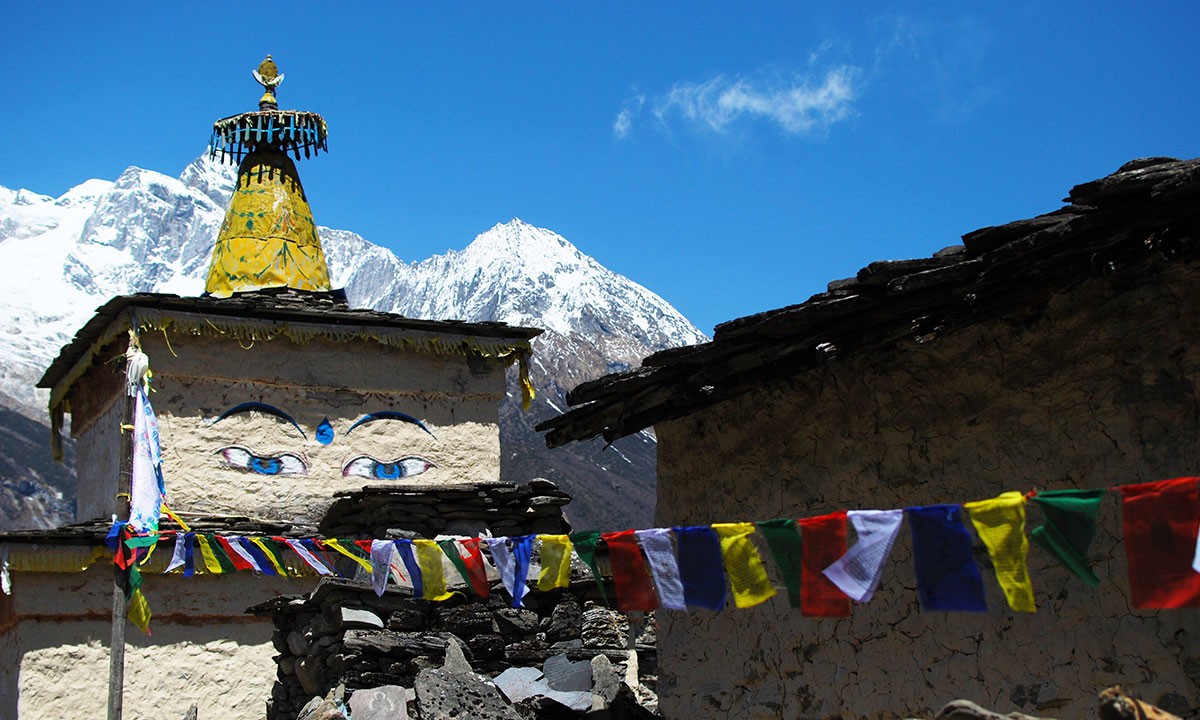
Typical Manaslu Circuit Trek Itinerary Outline
This is a typical itinerary outline of the 13-day Manaslu Circuit Trek:
Day 1: Driving from Kathmandu (1,400 meters) to Machha Khola (870 meters)
Day 2: Trekking from Machha Khola to Jagat (1,350 meters)
Day 3: Jagat to Deng (2,130 meters) trek
Day 4: Trekking from Deng to Namrung (2,630 meters)
Day 5: Namrung to Lho (3,180 meters)
Day 6: Trekking from Lho to Sammagaun (3,500 meters)
Day 7: Rest and exploration day at Samagaun
Day 8: Samagaun to Samdo (3,860 meters)
Day 9: Trekking from Samdo to Dharamsala (4,480 meters)
Day 10: Trekking down to Bimtang (3,720 meters) via the Larkya La Pass (5,106 meters)
Day 11: Bimtang to Tilche (2,560 meters)
Day 12: Trekking from Tilche to Dharapani (1,669 meters) and driving to Besisahar (1,,430 meters)
Day 13: Driving back to Kathmandu from Besisahar
Weather and Climate of Manaslu Trek in October
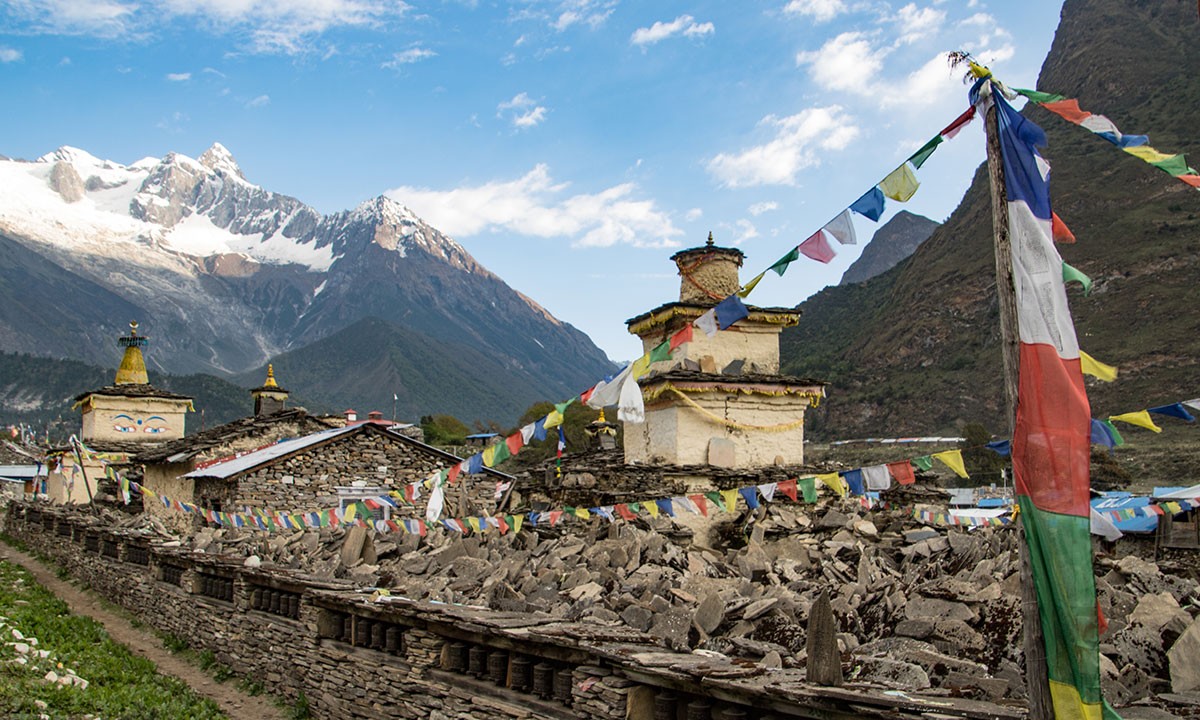
Both spring (March-May) and autumn (September- November) are the peak season that is ideal for the high altitude adventures in the country. The weather is stable and on the warmer scales during these peak seasons making it the perfect time for the Manaslu Trek. However, even in the autumn season which is considered to be the best season for trekking and mountain expeditions in the Himalayan region, October is considered the supreme month for this adventure.
The temperature of the Manaslu region in October is approximately around 15°C to 16°C on average during the daytime and it can drop to as low as -1°C at an elevation higher than 4,000 meters in the nighttime and early mornings. The mild temperature factor of this season makes the trekking experience really immersive and more enjoyable, and to top it all the the fresh chill breeze during the morning and nights makes the adventure exhilarating. October is the least humid month of the year, not only there is a low probability of rainfall and snowfall during this month, but also the unobstructed views of the Himalayas under a clear blue sky make every day’s exploration a memorable experience.
Festival in October
Manaslu Trek in October doesn’t only provides you the opportunity to relish the magnificent beauty of the Himalayan region in the most spectacular weather and climatic conditions, but it also opens the door for the cultural prospects of some of the major festivals in the country. October is arguably the grandest month of them all which boasts some of the most popular and significant festivals in the country.
Dashain/ Bijaya Dashami is one such festival which is the biggest festival in the country and is celebrated for upto 15 days. As Nepali follow Vikram Samvat, a Hindu lunar calendar the festival doesn’t always fall on a particular date, however, Dashain will typically start in the month of October. Similarly, if you are lucky, you will also be able to partake in another significant Hindu festival Tihar (Deepawali) which lasts 5 days. This beautiful festival of light generally follows the grand festival of Dashain and is celebrated shortly afterward its celebration.
Food and Accommodation of Manaslu Trek in October
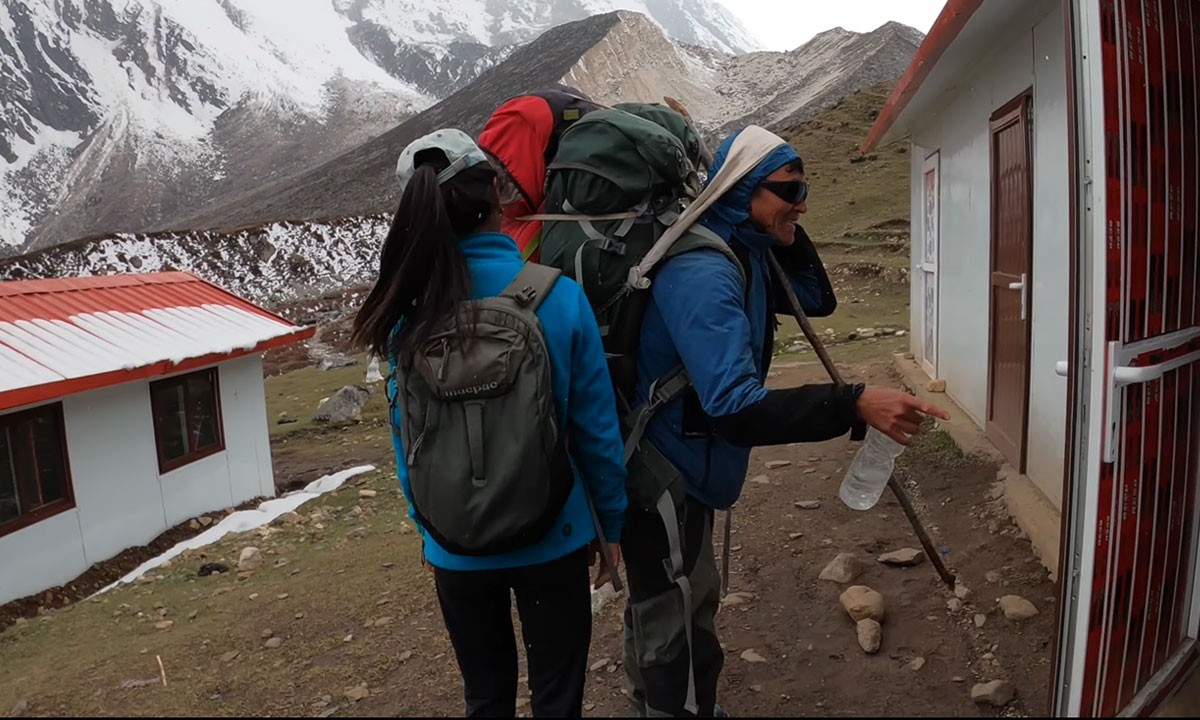 Autumn, which is also typically known as the ‘harvest season’ in Nepal doesn’t disappoint when it comes to presenting the finest delicacies to the guests. Especially, the mid-harvest month, October, offers a variety of delicacies to the guests and is considered to be the best season to enjoy the seasonal delicacies at their finest. The same goes for the eatery services at the teahouses along the trail, although the facilities and amenities of the teahouses along the Manaslu trek might not be developed like the other mainstream trekking routes. You will still be able to relish the dynamic local and traditional cuisines as well as some extensive continental menus.
Autumn, which is also typically known as the ‘harvest season’ in Nepal doesn’t disappoint when it comes to presenting the finest delicacies to the guests. Especially, the mid-harvest month, October, offers a variety of delicacies to the guests and is considered to be the best season to enjoy the seasonal delicacies at their finest. The same goes for the eatery services at the teahouses along the trail, although the facilities and amenities of the teahouses along the Manaslu trek might not be developed like the other mainstream trekking routes. You will still be able to relish the dynamic local and traditional cuisines as well as some extensive continental menus.
Here are some of the food menus that you can expect during your Manaslu Trek in October:
For Breakfast
- Bread
- Eggs
- Oatmeal
- Corn flakes
- Porridge
- Pancakes
- Soup
- Pudding
- Fruits
- Salad
- Sandwich
- Paratha
- Chapathi
- Papad
For Dinner and Lunch
- Daal bhaat tarkari (traditional Nepali dish with steamed rice, lentil soup and vegetable dishes)
- Dumplings/Momos
- Spaghetti
- Pizza
- Pasta
- Noodles
- Thukpa
- Thenduk
- Spring rolls
- Macaroni
- Steaks
- Chowmein
Note: Vegan and vegetarian meal options are also available throughout the teahouses along the trail.
For Drinks
For the drinks along the trekking route, you can have several options from hot drinks like tea, and coffee to soft canned juice and cold drinks to hard drinks like alcohol, wine, and whiskey. However hard drinks are not recommended during any high-altitude trekking adventure in the country as they complicate the acclimatization process.
As for drinking water, bottled mineral water is available throughout the trekking expedition, although the prices may vary depending on the altitude gain. You will be able to buy the bottled water at around US$ 0.25 during the lower trails, however, as you gain altitude the cost can reach upto US$ 4. Although you will find water tabs available throughout the trekking adventure, you are not recommended to drink them directly; use purification solutions or tablets. The best way to drink water in the Manaslu trekking expedition is to use the drinkable boiled water provided by the teahouses along the trail, and use purification solutions to stay on the sage side; you are recommended to drink at least 3- liters of water per day during the trek.
Accommodation
The accommodation facilities in the Manaslu trekking route are pretty much moderate, there isn’t a luxurious mode of trekking available, unlike the mainstream trekking routes. In most of the teahouses, you will rest in a shared bedroom, with 2- 3 beds per room and you will get all the basic essentials from a comfortable mattress, pillows, and blanket. As for the bathroom, you also used a shared facility, showers options are available at the lower region, however, at the high altitude, you will have to make do with the bucket of warm water.
Manaslu Trek in October Difficulty
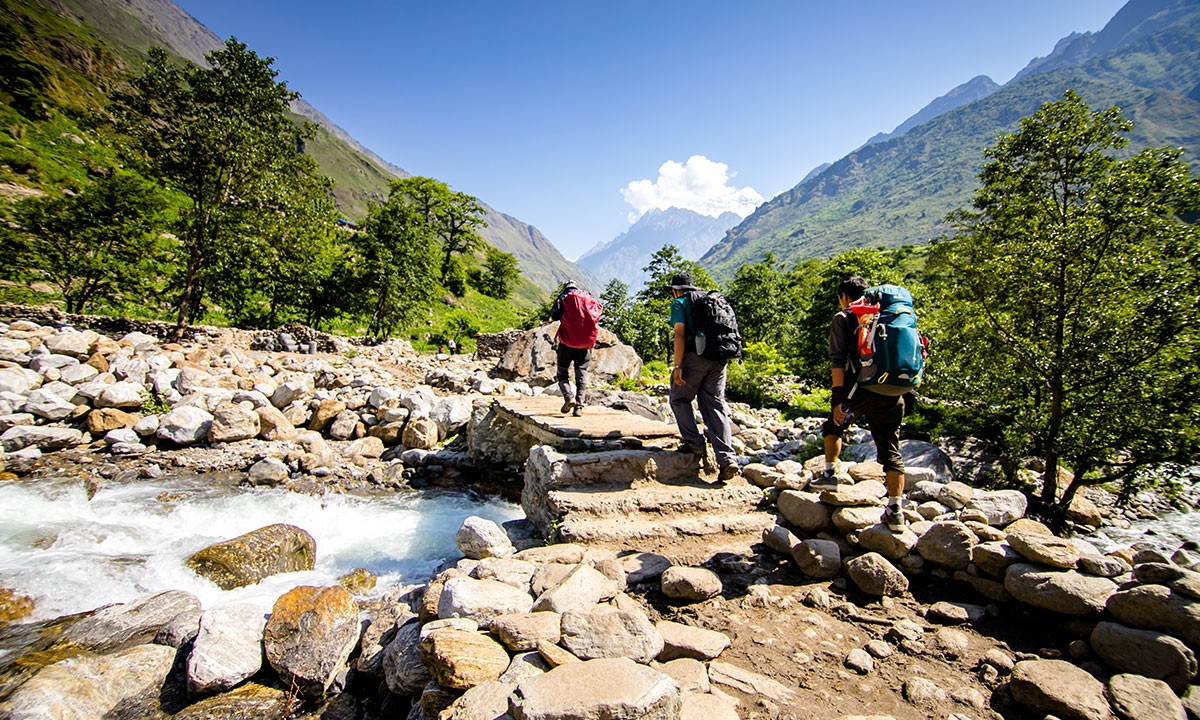
The Manaslu Trek in overall has been graded a ‘Moderately Difficult’ Himalayan expedition, which means that it is a relatively challenging adventure. However, you don’t need any prior trekking experience or technical skills as there are no technical segments en route to this magnificent exploration of the Himalayas. Still, it's a high-altitude adventure that takes you through the remote part of the Himalayas so, it is not like a hike in the park, you need to be well-prepared to overcome the difficulty factors of this adventure.
Here are some of the significant difficulty factors that contributed to the overall difficulty level of the Manaslu Trek in October.
Altitude Sickness
Altitude sickness is one of the most concerning difficulty factors when it comes to a high-altitude adventure. You might be familiar with how hard it is for the human body to adapt properly to the rising altitude above 2,500 meters which poses the risk of altitude sickness like Acute Mountain Sickness (AMS), High Altitude Pulmonary Edema (HAPE), and High Altitude Cerebral Edema (HACE).
Starting your adventure from Machhakhola (870 meters) you keep ascending through the high elevation jump points in this trek like Namrung (2,630 meters), Lho (3,180 meters), Samdo (3,860 meters), Dharamsala (4,480 meters) and the highest elevation point of this entire adventure Larkya La Pass (5,106 meters). So, you will spend a significant amount of time at altitudes above 2,500 meters. Even though all the Himalayan trekking adventures are slow-paced adventures where you will get enough time to acclimatize, Manaslu Trek in October can make it a little bit harder to acclimatize to the rising altitude as the temperature above the 4,000 meters can drop to minus degrees.
Trekking Route
The Manaslu circuit trekking is generally 13- 18 days long, depending on the itinerary package and exploration of the side attractions. So. in total you will cover an approximate distance of 177 km (110 miles) in this entire trekking adventure, which means you will be covering an approximate distance of 5- 6 hours on average on each day of the trek. So, it is in no way an easy feat to cover that much distance in rising altitude if you are not well prepared.
If you have prior experience in high-altitude trekking or you exercise daily, this Himalayan exploration might not be a big deal for you. However, for beginners without adequate preparation, this expedition can be physically vexing.
Remoteness
The Manaslu Circuit Trek is an overall remote exploration that explores the off-beaten secluded part of the Himalayas. So, unlike the mainstream trekking routes in the country, the services and amenities in this route are pretty much limited. As there are no proper modes of transportation in any of the trekking routes in Nepal, the trekking areas are not that technologically developed. The modernity of the services remains at the lower bay and there limited number of health facilities and you will have to depend on air rescue for any kind of unforeseen circumstances.
The same goes for the services of the teahouses along the route, their services are pretty much moderate to basics. You have to mentally prepare for this remote part of this trek and not have high expectations, so don’t get disappointed during the actual adventure.
Is Manaslu Trek in October Suitable for Me?
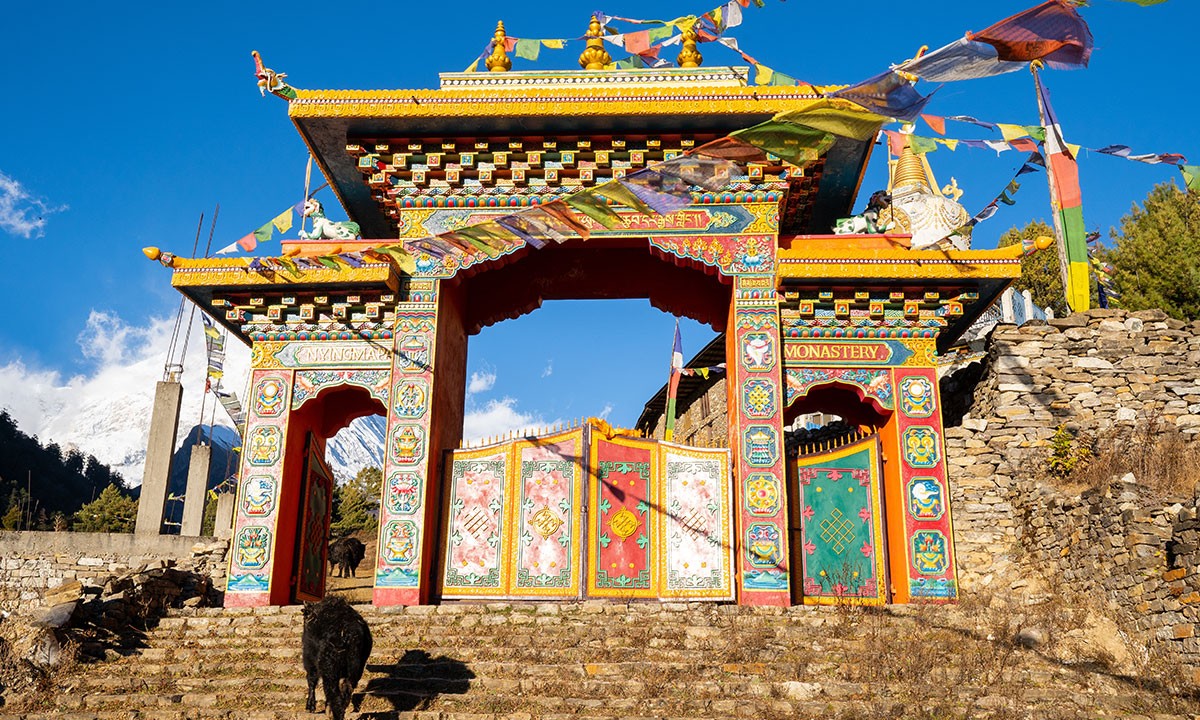
Manaslu Trek in October is a wonderful time to relish the true beauty of the Himalayas and the magnificent wide vistas under the clear blue sky. In case you are wondering if the Mansalu Tek in October is suited for you, fret not, you don’t need any kind of prior trekking experience to do this trek. You also won’t need any kind of technical skills to overcome the challenging segments of this Himalayan adventure. Manaslu trek with a moderate difficulty level can be achieved even by the beginner with the right amount of preparation.
Just a basic level of fitness with a good health condition is enough to do this trek, as this trekking adventure is not as strenuous as a mountain expedition, you don’t need to be in top shape either. However, you should work on your strength and endurance level during the preparation training so that the long hours of trekking carrying your backpack become more enjoyable rather than being a sour experience. If you have any kind of medical condition, you are recommended to consult your doctor about the adventure. As for the age factors, even children under the age of 10 and elderly trekking enthusiasts over the age of 70 have successfully completed this Himalayan exploration.
You may also like:


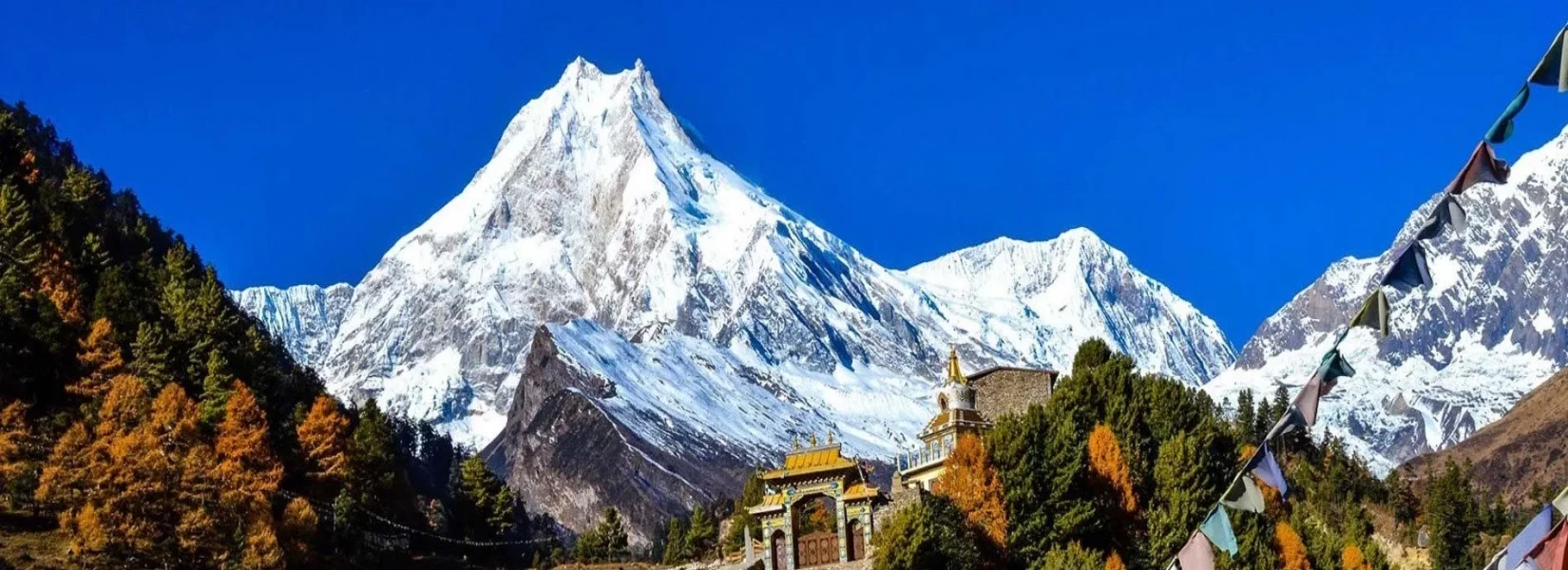


 Autumn, which is also typically known as the ‘harvest season’ in Nepal doesn’t disappoint when it comes to presenting the finest delicacies to the guests. Especially, the mid-harvest month, October, offers a variety of delicacies to the guests and is considered to be the best season to enjoy the seasonal delicacies at their finest. The same goes for the eatery services at the teahouses along the trail, although the facilities and amenities of the teahouses along the
Autumn, which is also typically known as the ‘harvest season’ in Nepal doesn’t disappoint when it comes to presenting the finest delicacies to the guests. Especially, the mid-harvest month, October, offers a variety of delicacies to the guests and is considered to be the best season to enjoy the seasonal delicacies at their finest. The same goes for the eatery services at the teahouses along the trail, although the facilities and amenities of the teahouses along the 

